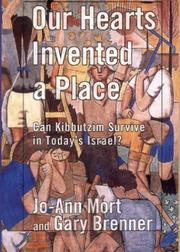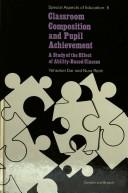| Listing 1 - 6 of 6 |
Sort by
|
Book
ISBN: 0720405564 9780720405569 Year: 1977 Volume: 108 Publisher: Amsterdam North-Holland
Abstract | Keywords | Export | Availability | Bookmark
 Loading...
Loading...Choose an application
- Reference Manager
- EndNote
- RefWorks (Direct export to RefWorks)
Economic order --- Israel --- Collective settlements --- Kibbutzim --- Kibbutz settlements --- Kibbutzes --- Ḳibutsim --- Kibbutzim. --- Collective settlements - Israel
Multi
ISSN: 16615875 ISBN: 1299432921 303530128X 3034301332 Year: 2011 Volume: v. 9 Publisher: Oxford ; New York : Peter Lang,
Abstract | Keywords | Export | Availability | Bookmark
 Loading...
Loading...Choose an application
- Reference Manager
- EndNote
- RefWorks (Direct export to RefWorks)
In reaction to the spread of globalization, recent years have seen considerable growth in the number of intentional communities established across the world. In this collection of articles and lectures, many of them previously unpublished in English, the author analyzes various aspects of the philosophy of the kibbutz and draws parallels with other societies and philosophical trends, in the hope that a close look at the ways of thought of the kibbutz "arguably the best-established communalist society" may help other communalists crystallize their own social philosophies. Utopian thought and communal experience are brought to life through the extensive use of the voices of some of the most influential thinkers and kibbutz members of the past hundred years, including Martin Buber and David Ben Gurion.
Kibbutzim --- Collective settlements --- History. --- Social conditions. --- Kibbutz settlements --- Kibbutzes --- Ḳibutsim --- Aliyah --- Judaism --- Kibbutz Movement --- Zionism

ISBN: 0511557337 052140388X 0521050278 Year: 1992 Publisher: Cambridge : Cambridge University Press,
Abstract | Keywords | Export | Availability | Bookmark
 Loading...
Loading...Choose an application
- Reference Manager
- EndNote
- RefWorks (Direct export to RefWorks)
This work in the field of intellectual history explores religious ideas which emerged in Jewish thought under the influence of secular ideologies, and in response to the social and cultural realities created by Jewish Emancipation, Zionism and socialism. By concentrating on the major Jewish Orthodox movements of the nineteenth and twentieth centuries, Professor Fishman examines the innovative mechanisms of traditional Judaism that were activated by these movements, as they strove to accommodate new realities. The study focuses specifically on the Religious Kibbutz Federation in Israel, which (in the process of building its self-contained pioneering settlements) developed a religious sub-culture that incorporated the central values of Jewish nationalism and socialism. Professor Fishman shows that - by creating the most far-reaching synthesis of modern, and traditional Jewish, culture at the community level - the settlements of the RKF may be regarded as a test case for the measure of the capacity of Judaism to adapt to modern life.
Orthodox Judaism --- Kibbutzim --- Religious Zionism. --- Judaism --- Zionism --- Kibbutz settlements --- Kibbutzes --- Ḳibutsim --- Collective settlements --- Jewish sects --- Ex-Orthodox Jews --- History. --- Religion. --- Ḳibuts ha-dati (Israel) --- Religious Kibbutz Federation (Israel) --- RKF --- Hakibbutz Hadati (Israel) --- Kibbutz Dati (Israel) --- קיבוץ הדתי --- קיבוץ הדתי (ישראל) --- Arts and Humanities --- Religion

ISBN: 1501729004 0801439302 Year: 2018 Publisher: Ithaca, NY : Cornell University Press,
Abstract | Keywords | Export | Availability | Bookmark
 Loading...
Loading...Choose an application
- Reference Manager
- EndNote
- RefWorks (Direct export to RefWorks)
"We thought we were living in a society of the future, showing how people can live together in a way that the human being is not a product of society where you have to put somebody down so that you are up.... Suddenly we [find] that people want to be more like outside, and we are disappointed."When people say to me, 'We're so sorry to see what's going on in the kibbutzim because we are losing the most important thing that happened to the State of Israel,' I say to them, 'Listen....' The government lost interest in the kibbutz movement, and we had to find another way. The State of Israel slowly but surely became a normal state, and the pioneers finished their job. We are living in a new era. We have to make the adjustment."-from Our Hearts Invented a PlaceOne of the grand social experiments of modern time, the Israeli kibbutz is today in a state of flux. Created initially to advance Zionism, support national security, and forge a new socialist, communal model, the kibbutzim no longer serve a clear purpose and are struggling financially. In Our Hearts Invented a Place, Jo-Ann Mort and Gary Brenner describe how life on the kibbutz is changing as members seek to adapt to contemporary realities and prepare themselves for the future. Throughout, the authors allow the members' often-impassioned voices-some disillusioned, some optimistic, some pragmatic-to be heard."The founders [of the kibbutz] had a dream," an Israeli told the authors in one of many interviews they conducted between 2000 and 2002, "[which] they fulfilled... a hundred times." The current generation, he explains, must alter that dream in order for it to survive. After tracing the formidable challenges facing the kibbutzim today, Mort and Brenner compare three distinct models of change as exemplified by three different communities. The first, Gesher Haziv, decided to pursue privatization. The second, Hatzor, is diversifying its economy while creating an extensive social safety net and a system of private wages with progressive taxation. In the third instance, Gan Shmuel is attempting to hold on to the traditional kibbutz model.In closing, the authors address the new-style urban kibbutz. Their book will provide readers with a deeper understanding of the kibbutz-and of Israel itself-during an era of dramatic social, economic, and political change.
Kibbutzim --- Kibbutz settlements --- Kibbutzes --- Ḳibutsim --- Collective settlements --- Social conditions --- Gan Shemuʼel (Israel) --- Gesher ha-Ziṿ (Israel) --- Ḥatsor Ashdod (Israel) --- H̲az̲or Ashdod (Israel) --- Yasur (Israel) --- Gesher Haziv (Israel) --- Gesher HaZiw (Israel) --- Jisr ez Zib (Israel) --- Gan Shmuel (Israel) --- Ganshmuel (Israel)

ISBN: 0710099614 9780203832639 0203832639 9780710099617 9780415609388 0415609380 128304109X 9786613041098 9781136837654 9781136837692 9781136837708 9780415609432 1136837698 6613041092 Year: 2010 Publisher: London ; Boston : Routledge & Kegan Paul,
Abstract | Keywords | Export | Availability | Bookmark
 Loading...
Loading...Choose an application
- Reference Manager
- EndNote
- RefWorks (Direct export to RefWorks)
Some communities exist for tens, even hundreds, of years. Others short-lived. What, then, makes for communal 'success'? Bary Shenker, who lived on a Kibbutz for a number of years, compares the Hutterites, the Kibbutzim and therapeutic communities - and argues that there is no simple formula. Through historical and sociological analysis, combined with personal experience and insight, the author provides fresh thoughts on a form of a social life which fascinates us all. First published in 1986.
Collective settlements --- -Communal settlements --- Communistic settlements --- Communism --- Cooperation --- Socialism --- Collective farms --- Communal living --- Case studies --- Alienation (Social psychology) --- Hutterite Brethren --- Ideology --- Kibbutzim --- Therapeutic communities --- Case studies. --- -Case studies --- Communities, Therapeutic --- Community, Therapeutic --- Therapeutic community --- Kibbutz settlements --- Kibbutzes --- Ḳibutsim --- Hutterische Brüder --- Hutterites --- Communal settlements --- Alienation, Social --- Disaffection (Social psychology) --- Estrangement (Social psychology) --- Rebels (Social psychology) --- Social alienation --- Alternatives to psychiatric hospitalization --- Mental health facilities --- Milieu therapy --- Knowledge, Theory of --- Philosophy --- Political science --- Psychology --- Thought and thinking --- Anabaptists --- Christian sects --- Social psychology --- Social isolation --- Hutterian Brethren

ISBN: 0677214502 Year: 1986 Publisher: New York (N.Y.): Gordon and Breach
Abstract | Keywords | Export | Availability | Bookmark
 Loading...
Loading...Choose an application
- Reference Manager
- EndNote
- RefWorks (Direct export to RefWorks)
Achievement. --- Education. --- Group Processes. --- Mainstreaming (Education) --- Social Desirability. --- Ability grouping in education --- -Academic achievement --- -Children of minorities --- -Kibbutzim --- -Mainstreaming in education --- -Children with disabilities --- -Children with special educational needs --- Children with special health care needs --- Children with special needs --- Handicapped children --- Physically handicapped children --- Special needs children --- Exceptional children --- People with disabilities --- Education --- Inclusive education --- Kibbutz settlements --- Kibbutzes --- Ḳibutsim --- Collective settlements --- Minority children --- Minority group children --- Minorities --- Academic underachievement --- Achievement, Academic --- Educational achievement --- Scholastic achievement --- Scholastic success --- School achievement --- Student achievement --- Underachievement, Academic --- Performance --- Success --- Classification of school children --- Classification of students --- Graded schools --- Grouping, Homogeneous --- Grouping by ability --- Homogeneous grouping --- School children --- Streaming (Education) --- Students --- Educational psychology --- Grading and marking (Students) --- School management and organization --- Social Worth --- Desirabilities, Social --- Desirability, Social --- Social Desirabilities --- Worth, Social --- Mainstreaming --- Mainstreamings --- Mainstreamings (Education) --- Child, Exceptional --- Disabled Persons --- Group Meetings --- Group Process --- Group Thinking --- Group Meeting --- Group Thinkings --- Meeting, Group --- Meetings, Group --- Process, Group --- Processes, Group --- Thinking, Group --- Thinkings, Group --- Sociology --- Activities, Educational --- Educational Activities --- Workshops --- Literacy Programs --- Training Programs --- Activity, Educational --- Educational Activity --- Literacy Program --- Program, Literacy --- Program, Training --- Programs, Literacy --- Programs, Training --- Training Program --- Workshop --- Achievements --- Case studies --- -Case studies --- Classification --- education --- Israel. --- Academic achievement --- Children of minorities --- Children with disabilities --- Kibbutzim --- Mainstreaming in education --- Achievement --- Group processes --- MAINSTREAMING (EDUCATION) --- Social desirability --- Case studies. --- Group processes. --- MAINSTREAMING (EDUCATION). --- Social desirability. --- Mainstreaming (education). --- Group Processes --- Social Desirability --- Academic Performance --- Children with special educational needs --- Education&delete& --- Educational Mainstreaming --- Mainstreaming, Educational --- Education Mainstreaming --- Academic performance --- Academic progress --- Academic success --- Achievement, Scholastic --- Achievement, Student --- Performance, Academic --- Progress, Academic --- School success (Academic achievement) --- Success, Academic --- Success, School (Academic achievement) --- Success, Scholastic --- Accomplishment --- Accomplishments
| Listing 1 - 6 of 6 |
Sort by
|

 Search
Search Feedback
Feedback About UniCat
About UniCat  Help
Help News
News